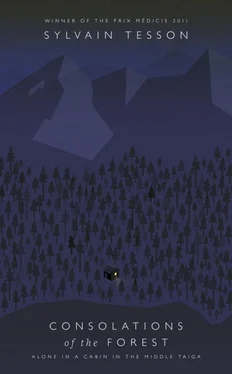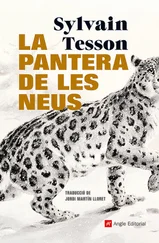And yet, deep in the woods, what we see of animals is troubling. How can we be certain that a dancing cloud of midges in the setting sunlight has no meaning? What do we know about the thoughts of a bear? What if crustaceans bless the coolness of water without having any way to let us know this, while we have no hope of ever figuring this out? How can we measure the emotions of sparrows when they greet the dawn from the highest branches? And why shouldn’t butterflies in the noonday sun find some aesthetic feeling in their choreography? ‘The one-year-old bird has no notion of the eggs for which it builds a nest, or the young spider any idea of the prey for which it spins a web…’ (Schopenhauer in The World as Will and Representation ). But what do you know about that, Arthur? Where did you obtain your information on this subject, from what conversation with which bird do you draw such certainty? My two dogs choose to face the lake, blinking, enjoying the peace of the day, and their drool is a thanksgiving. They are conscious of the happiness of resting there, on the summit, after the long climb. Heidegger tumbles into the water and Schopenhauer as well. Glug-glug, goes thought. I regret that some philosopher schooled in the old humanism (a spiritual masturbation) cannot witness the silent prayer pronounced by two five-month-old pups before a geological fault 25 million years old.
Back to the lake. It creaks in the peace of the evening. The ice is saying farewell: no wonder it’s moaning.
28 MAY
I spend the day with Delachaux and Niestlé’s bird guide: ‘848 species and 4,000 drawings’. This book is a breviary devoted to the ingenuity of life, to the infinite subtleties of evolution, a celebration of style. Even the most sophisticated of urban dwellers for whom birds are stupid robots with crazed eyes, blown hither and yon by the wind, will bow before the audacious livery of the pheasant, the rock ptarmigan or the ruddy shelduck. I try to identify each of the visitors from the sky. Putting names to plants and animals using field guides is like recognizing superstars in the street thanks to celebrity magazines. Instead of: ‘Ohmigod, it’s Madonna!’, you exclaim: ‘Wow, there’s a Siberian crane!’
29 MAY
I always go out with a flare gun in my hand in case a bear is roaming the forest. The wilderness begins right outside the door. My home offers no transition; no garden, for example. There is a threshold, of course: a plank, an ‘air lock’ between the civilized world and the perils of the forest. Stags, lynxes and bears stroll by the cabin; the dogs sleep right outside the door, flies buzz up under the eaves. The two realms are contiguous. The cabin is a tiny island of human survival in this Eden and not an implantation of pioneers determined to improve the earth. During the conquest of Siberia, the tsar’s Cossacks built entrenched camps, enclosing a church, an arms depot and a few buildings behind a palisade of pines trimmed into points at the top. They called such a small fortress an ostrog , and these posts protected them from an outside world that had all the time in the world to wait them out. If the Cossacks were there, it was because they dreamed of transforming the taiga, whereas a hermit is content to be dwelling in the forest. The windows serve to welcome nature per se , not to fend it off. The hermit contemplates nature, uses what he needs of it, but cherishes no ambitions to subdue it. The cabin allows him to take a position, but does not enforce a statute. He may play the hermit, but not claim to be a pioneer.
The hermit agrees to be henceforth weightless in the workings of the world, no longer counting as anything in the chain of causality. His thoughts will not influence anyone, or affect the course of events. His actions will signify nothing. (Perhaps he may still figure in a few memories.) How light that thought is! And how clearly it foretells the final release: we are never so alive as when we are dead to the world!
A russet moon rose tonight, its reflection in the shattered lake ice like a blood-red Host on a wounded altar.
30 MAY
Today I wrote little things on the trunks of some birches. Birch, I entrust this message to you: go tell the sky I say hello . Birch bark feels as pleasant to write on with a pen as parchment is. Certain zeks recorded their memories on the skin of these trees.
After that, I skipped some stones, and now I’m trying to improve my knife-throwing with an old board for a target.
It really is nice to have some free time.
31 MAY
A mountain slope of 5,000 feet extends that much again on its journey down to the bottom of Baikal, and my cabin sits precisely at this halfway point, on a tiny break in a descent just under two miles long. I live balanced between a gulf and a rock face. The river has finally broken the sheath of ice along the shore, opening the sluices. The torrents tumble and frolic all the way to the lake, making the sound of life on its way to a party. The rivers are slashing their way through the forest.
A pair of eiders takes the waters just off the cape. Whenever two sheets of drifting ice threaten to close in on them, they fly off to another open spot. An allegory of exile.
Sometimes my gaze lingers on a stretch of open water on which two ducks then suddenly alight, as if to fulfil a presentiment. As when the eye discovers in a book a phrase for which the mind has long been waiting without ever managing to compose it.
The first Capricorn beetles have arrived. They fly heavily through the clearing and plunk down upon the chopping-blocks. I feel affection for these insects. Their long, black, backswept antennae frame their jet carapaces. They scramble clumsily over the trunks of the pines. Love thy neighbour as thyself . Wouldn’t real love be the love of what is irremediably different from us? Not a mammal or a bird, for they are still too close to our humanity, but an insect, a paramecium. Humanism gives off whiffs of a corporatism based on the imperative to love what resembles us. We are supposed to love one another the way the dentist loves other dentists. In the clearing, I reverse the proposition and try to love creatures with an intensity proportional to their degree of biological distance from me. To love is not to celebrate one’s own reflection in the face of one’s double, but to recognize the value of what one can never know. Loving a Papuan, a child or one’s neighbour is hardly a challenge. But a sea sponge! A lichen! One of those tiny plants roughed up by the wind! Here’s what’s tough: feeling infinite tenderness for the ant busy rebuilding its hill.
A short afternoon at Middle Cedar Cape to observe the geese sailing around the inland pond. On the way back, I find fresh bear tracks mixed with mine. They weren’t there before. The dogs don’t react at all. I pass again by the ruins of the refusenik’s cabin. Must a man head for the woods at all costs if he rejects his times? There is silence to be found in these secluded vaults.
One can also close one’s eyes: the eyelid is the most effective screen between the self and the world.
V.E. down at Zavorotni has often spoken to me about the dissident who lived here, describing him to me as a nice fellow. The idea of this noble soul’s existence in harmony with the brutal beauty of these surroundings makes me see this cabin in a friendly light. I imagine the poor man picking wild onions to flavour his char, talking to the birds, leaving the remains of his fish on the shore for the foxes. It’s only in Paris, where I live, that intellectuals cultivate a fascination for bastards and make heroes of criminals. Which is the error denounced by Varlam Shalamov, who survived seventeen years in the gulag, in his Essays on the Criminal World : ‘…every writer seems to have chipped in on this sudden demand for a romanticism of crime, this frenzied poeticizing of thugs…’ Criminals are not heroic wolves. And the cabins that have sheltered them do not give off an aura of serenity.
Читать дальше












